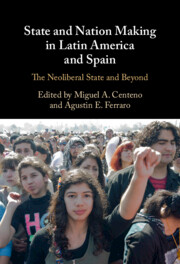Book contents
- State and Nation Making in Latin America and Spain
- State and Nation Making in Latin America and Spain
- Copyright page
- Dedication
- Contents
- Notes on Contributors
- Preface
- Part I Introduction
- Part II Economic and Territorial Power
- Part III Infrastructural Power: Reform Strategies
- Part IV Symbolic Power: Identities and Social Protest
- 11 Women Are the Social Face of the State
- 12 Europeanization Effects
- 13 Redefining Labor Organizing
- 14 Locating Neoliberalism in Abiayala
- 15 Resisting Neoliberalism? Territorial Autonomy Movements in the Iberian World
- Part V Conclusions
- Index
- References
14 - Locating Neoliberalism in Abiayala
A View from Indigenous Studies
from Part IV - Symbolic Power: Identities and Social Protest
Published online by Cambridge University Press: 03 August 2023
- State and Nation Making in Latin America and Spain
- State and Nation Making in Latin America and Spain
- Copyright page
- Dedication
- Contents
- Notes on Contributors
- Preface
- Part I Introduction
- Part II Economic and Territorial Power
- Part III Infrastructural Power: Reform Strategies
- Part IV Symbolic Power: Identities and Social Protest
- 11 Women Are the Social Face of the State
- 12 Europeanization Effects
- 13 Redefining Labor Organizing
- 14 Locating Neoliberalism in Abiayala
- 15 Resisting Neoliberalism? Territorial Autonomy Movements in the Iberian World
- Part V Conclusions
- Index
- References
Summary
Evidence from Indigenous organizing in Bolivia, Ecuador, and Chile offers useful illustrations of the ways in which Indigenous peoples have challenged (and been challenged by) neoliberalism and settler colonial orders. While there are sound reasons to say that Indigenous movements have been “stronger” in Bolivia and Ecuador than in Chile, I make the more modest claim that all three countries provide useful ways to think about the longue durée of colonial entanglements in Latin America. Viewing neoliberalism through the lenses of Settler Colonial Studies and Indigenous Studies offers two different ways of situating the central concern of this volume. First, it provides an alternative timescale, one that situates neoliberalism not only within the twentieth and twenty-first-century swing of statist and market-based development models, but within a longer colonial history of extractivism, state formation, and Indigenous struggles. Second, it considers the politics of neoliberalism as both an enabling condition of Indigenous mobilization and demobilization. Neoliberalism, from the vantage point of Indigenous Studies, is part of an ongoing story of colonial dispossession, anti-colonial resistance, and negotiation.
- Type
- Chapter
- Information
- State and Nation Making in Latin America and SpainThe Neoliberal State and Beyond, pp. 428 - 461Publisher: Cambridge University PressPrint publication year: 2023



